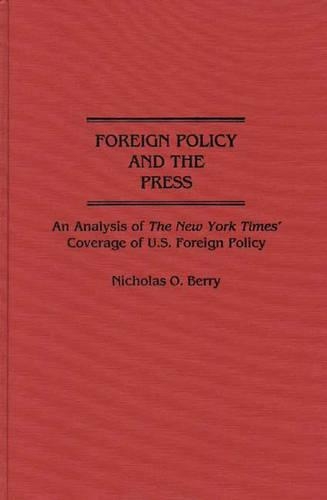
Foreign Policy and the Press: An Analysis of The New York Times' Coverage of U.S. Foreign Policy
(Hardback)
Publishing Details
Foreign Policy and the Press: An Analysis of The New York Times' Coverage of U.S. Foreign Policy
By (Author) Nicholas Berry
Bloomsbury Publishing PLC
Praeger Publishers Inc
17th October 1990
United States
Classifications
Tertiary Education
Non Fiction
News media and journalism
070.44932773
Physical Properties
Hardback
184
Width 156mm, Height 235mm
907g
Description
The role that the press plays in foreign policy is generally seen as taking one of two forms. It is either cited as an active participant in the policy process or as an instrument to be moulded and manipulated by the president and his media managers. This study challenges both of these views and demonstrates that the press is neither a powerful force in foreign policy nor under the control of the government in its reporting of foreign policy. Nicholas Berry concludes that to a far greater extent than with domestic policies, the press is at one with the foreign policy establishment, accepting the government's assumptions and formulations until a policy begins to fail. At this outcome stage, the government tries, unsuccessfully, to manipulate the critical press. The study is based on a content analysis of "The New York Times" reporting of foreign policy disasters. Five case studies were chosen for five recent presidents: the Bay of Pigs (Kennedy), Vietnam (Johnson), the Cambodian incursion (Nixon), the Iranian hostage crisis (Carter), and the 1982-1984 intervention in Lebanon (Reagan). In each case, "The New York Times" articles were examined and analyzed against the administration's foreign policy statements. Berry details the policy orientation of each administration, describes the "Times" coverage, and draws conclusions in all five cases. In a final chapter, he discusses the implications of his findings and addresses such issues as the difference between domestic and foreign policy reporting and the notion that foreign-based correspondents are more critical of foreign policy than are US-based reporters. Two appendices and a bibliography are also included. This study will be a valuable resource for courses in journalism, behavioural studies on the media, and American foreign policy, and a significant addition to public, college, and university libraries.
Reviews
"A remarkable combination of systematic analysis and fascinating case studies of the symbiosis between journalists and the U.S. foreign policy elite."- J. David Singer University of Michigan
"Nicholas Berry has written a truly refreshing book and a major contribution to the debate over the role played by the press in U.S. foreign policy."-Stephen Hess Senior Fellow, The Brookings Institution
Author Bio
NICHOLAS O. BERRY is a Professor and the Chairperson of the Department of Politics at Ursinus College. He is the author of Political Configurations, editor of two books, and coauthor of IR: An Introduction to International Relations. His academic work has appeared in Orbis, Presidential Studies Quarterly, The Yale Review, and many other journals. In addition, his op-ed pieces have appeared in The New York Times and the Philadelphia Inquirer. He was a political columnist for The Evening Phoenix and also served as Democratic Party Chairman in Lynchburg, Virginia, and Mayor and Council Member in Mt. Vernon, Iowa.
